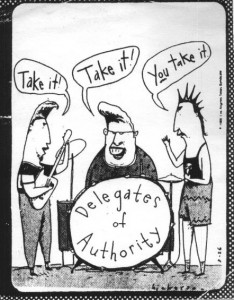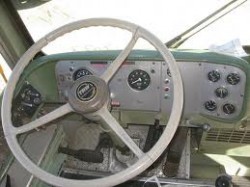Apr 14
24
Integration of the Mind – Part Eighteen
Principles of Delegation Defined and Refined
“Put simply, effective management means getting things done through people” …so began the first speaker in an intense two week training course put on by American Management Association which I attended forty years ago and was paid for by the company for which I then worked.
“Delegation is an exercise in futility, if you haven’t picked the right person for the job and if you don’t have an effective system by which to monitor progress,” was another note I took at the time.
While these two principles may not sound all that profound to us today, I am compelled by the word “allow” that hit me just before my feet hit the floor this morning at around 4:00 a.m. “What’s with that?” I asked and got the above subtitle which made my mind begin to reel in anticipation.
Integrating or Reintegrating the mind with our SPIRIT-PARENT, “as it was in the beginning” and considering all the scientific research about the various parts of our mind, both those of which we are aware and those which elude our consciousness, but have been proven over and again, scientifically, to be an integral part of what we refer to as the totality of our minds and which influence our individual thoughts and behavior; can it be a matter of delegation – that is, picking the right part for the job?
Here we go with a story, for the purposes of illustrating the point, what a surprise, a story …right?
It was the early nineteen-fifties. I was a partner in a trucking company – my partner owned and operated a heavy-duty truck repair shop; I had formerly been a customer of his, he had taken care of the maintenance of the three lumber rigs I owned and operated.
A friendship ensued and a partnership in an expanded trucking operation turned out to be a very good fit for both of us.
I handled the hiring and managing of the drivers and other parts of the operation, including sales and customer contact for building the business and my partner handled the hiring and managing of mechanics and other shop personnel as well as overseeing billing, collections and all the necessary record-keeping.
We had just purchased a 1946 Kenworth two axle tractor with a set of doubles, that is, twin 20’ flatbed trailers for a specific run – lumber and plywood south into the Los Angeles basin and two huge rolls of newsprint for the backhaul to Oakland –one roll per trailer– on average a 900 mile round trip. It was the oldest rig in the fleet and none of our regular drivers wanted to drive it.
Because of the type of engine, a 175 hp Cummins diesel, with an old style fuel pump – it was tricky to drive because in going down a long grade the rpm rate had to either be kept below 1200 or fuel had to be kept running through the pump otherwise it would be damaged and could even ruin the engine.
What that meant is that the driver had to go very slow down long grades and constantly “power brake” which meant keeping one foot on the fuel feed pedal and the other on the airbrake control pedal. This sounds simple until factoring in that this particular truck had 20 gears forward by utilizing two transmissions in line; a main transmission with five gears and a four speed auxiliary transmission designed to split each of the main gears progressively – this was before the days of synchromesh, meaning that using the clutch was almost mandatory and because of the relatively low amount of horsepower available had to be used constantly going up hills, down hills and on the level.
Basically, if you read back through the foregoing paragraph you will readily see that operating the vehicle required three feet and a lot of concentration plus the use of two hands to simultaneously shift the control levers of the two transmissions and a third hand to steer …and a fourth hand to hold on to the door handle while slowly crawling down long grades in case of brake failure and the driver had to “bail out.”
For a variety of reasons, I’ll spare you those details, my partner and I had decided that this particular piece of equipment would stay on the coast highway …the old and rather famous U.S. 101 which was, for the most part, in those days, a two lane highway with many curves, including some “hairpins” …all and all adding about eighty miles and two hours to the trip making both the truck and the trip a grueling workout and totally unappealing to our regular drivers.
Getting down to the point (yes, finally), every time a driver quit, which was a frequent occurrence, or couldn’t make the trip, for whatever reason …it was not always a simple matter to replace him. The backhaul was very profitable, but required not only the special care and operating skills enumerated above, but timeliness and customer relation skills …the latter not always prevalent in over-the-road truck drivers of that day.
On those occasions either my partner or I made the trip. On the northbound leg out of L.A., on one of my turns; late at night, I stopped to fuel and get a bite to eat at a truck stop in Ventura, California. I told the attendant that I was going get a couple hours sleep in the truck and to please wake me at 2:00 a.m.
I was awakened to extremely dense fog. I made the obligatory checks around the rig with a flashlight …oil, water, air lines, all eighteen wheels, clearance lights, load cables and so on. Got in and pulled out onto the highway …I woke up startled over eight hours later stopped at a traffic signal in downtown San Jose, through which U.S. 101 ran at the time.
It was about 10:30 a.m., I could remember nothing of any of the about 300 miles I had just traveled, in a vehicle with a gross weight of 75,000 lbs., constantly going through all those gears, going up and down grades and through small towns navigating heavy traffic – obviously my subconscious mind had done a superb job handling the limitations of the aforementioned fuel pump – as the truck was running perfectly …as soon as possible I pulled over to check the tires, water, oil and the load; the only thing the subconscious hadn’t done was to turn off the lights – a blazing sunlit day with both the headlights and clearance lights left on – something I never would have done consciously; or perhaps, I thought, maybe the thick fog had persisted long after daybreak, which is not uncommon along the northern California coast line.
_____
What are the implications and what (application do I make) now? You probably have your own memory of times when the subconscious has taken over some task or another. We’ve all certainly heard stories of people doing amazing things without any consciousness or memory of what they had accomplished subconsciously.
We all certainly know that many of our bodily functions such as breathing, heart beating, and cell-regeneration, etc., are all handled by the subconscious. What I’m wondering right now is whether we can consciously delegate certain responsibilities to the subconscious mind.
Two appropriate questions in managing through others is to ask before delegating a responsibility to an individual, in one form or another: “Is this something you are capable of handling?” and, “are you willing to see it through to satisfactory accomplishment?”
Something else I had taken away from that two week management training session: “You will never, ever be an effective manager if you micro manage …that is, once you have delegated the responsibility, you must step back and allow the person to handle it her or his way.”
There we are with that word I woke up to this morning – “allow.”
Am I guilty of inappropriately overriding and interfering with the subconscious with the part of my mind that consciously thinks, worries, images about all sorts of things when the subconscious is perfectly capable and willing to manage a particular activity automatically?
With this memory of the subconscious driving a complicated power unit, pulling two trailers and weighing over thirty-seven and a half tons, while the conscious mind is oblivious, is there any reason that it cannot be held responsible for routine matters? Can I simply give the command or request, if you prefer, for the subconscious to get certain things done …and as the management training program strongly suggested, allow it to accomplish the job without interfering?
The thought is almost overwhelming …I just now asked if I was on the right track. I went directly to our SPIRIT-PARENT and then assembled my mastermind group of advisors and was shown in vivid detail how to accomplish this feat with something that amazed me.
What we will delve into next is an effective way to replace habit patterns which are often blamed on the sub-conscious, when it is actually our conscious minds creating some of the challenges in our lives.
Specifically I’m being shown a way to leave the driving to the subconscious when it comes to managing stress and to have it take over the responsibility of replacing a stress response to so many things in my life which would be far better for my physical, emotional and mental health to be handled in a state of relaxation. Is this possible?
The answer is ABSOLUTELY and quite simply – that’s what’s next in:
Integration of the Mind – Part Nineteen
-Allowing the Better Driver to Do its Job-






